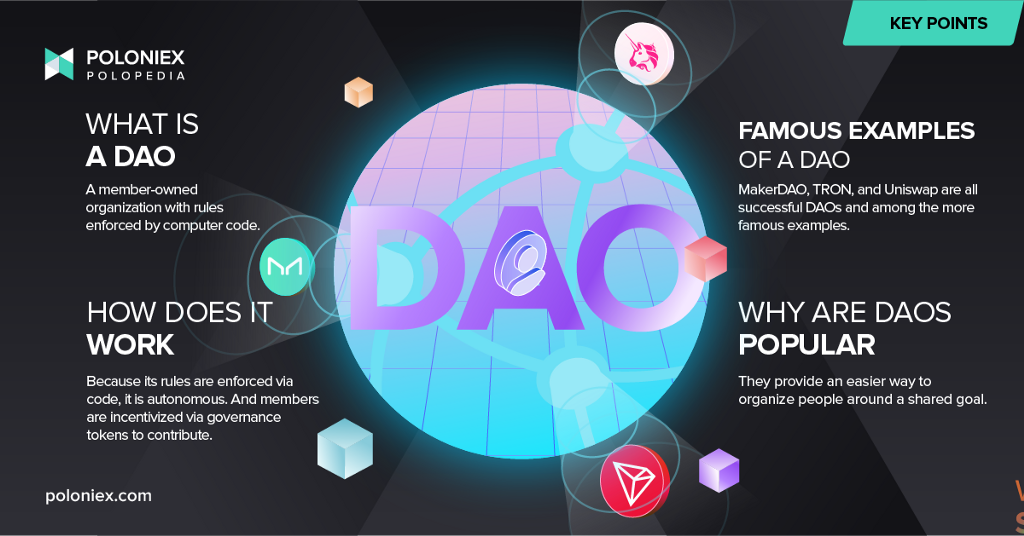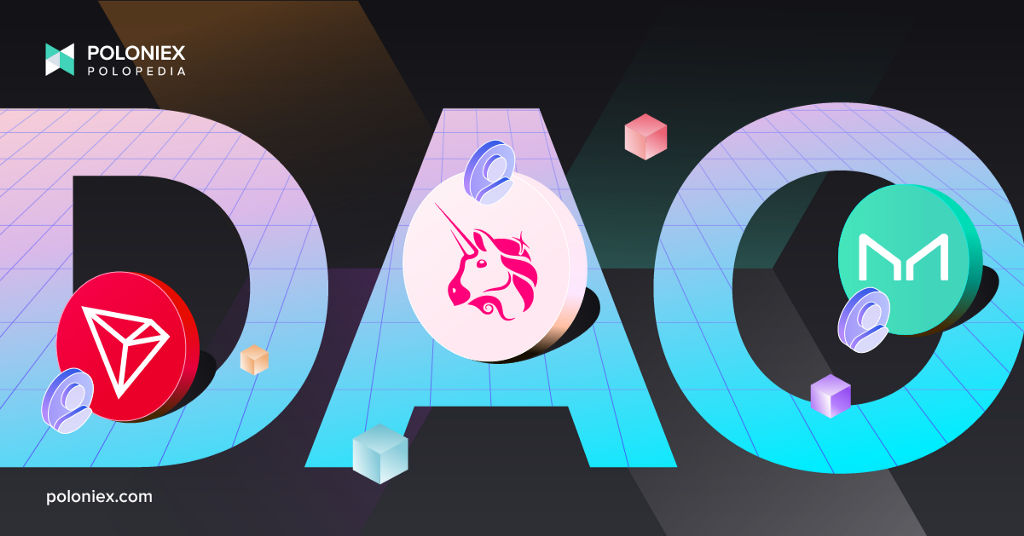Within a DAO, members can more easily organize around a central purpose and have true ownership of the organization through the use of governance tokens.

What is a DAO?
“DAO” is an acronym that stands for decentralized autonomous organization. Existent since circa 2016, DAO’s have skyrocketed in popularity in 2020 due to the Coronavirus pandemic as people around the world moved more online.
A DAO is essentially software that runs on a blockchain, and its rules are encoded into smart contracts deployed on the blockchain. It is one of the strongest use cases in governance for blockchain technology. That is, because blockchains are immutable, only appendable through consensus, a DAO must have members vote on changes to the code or its other operations. And through the issuance of governance tokens, it incentivizes its members to work toward a common goal.
Some famous examples of DAOs are MakerDAO, Uniswap, CurveDAO, and TRON.
A DAO’s role in society
Interestingly, this concept’s use case isn’t only in governance and business building, but also community building. As mentioned before, DAO’s saw a huge increase in overall adoption amid the pandemic. It could be argued that the masses that migrated to DAO-centric communities online did so because they were looking for a sense of belonging in a place organized around any one central goal.
And DAOs, because they are internet-native, have become a sort of on-ramp from online group chat to legitimate business.
What is interesting about how people get and stay involved in a DAO is that they are not bound by any contract, but rather have vested interest from holding the DAO’s tokens.
How a DAO works
To understand how a DAO works, let’s begin by looking at how it starts. Like any organization, a DAO is established by a founding team that decides on what the DAO’s purpose is and by what rules it functions. These rules are coded into a smart contract.
Rules here include how funds are used, how fees might be allocated, etc.
The rules of a DAO are encoded within a smart contract that operates and stores its rules and transaction history on a blockchain.
A DAO will then raise funds via token issuance, where token holders can then invest and get governance tokens in return, allowing them to vote on proposals in proportion to their holdings.
But why?
Why form a DAO? DAOs do not in fact lend themselves to any sort of shared goal one would want to accomplish. And for those scenarios where a DAO makes sense, what advantages does the model offer?
Well, for starters, much of the crypto world, and online world for that matter, is anonymous. Because a DAO operates on that same anonymous, trustless, distributed ledger technology called the blockchain, it provides a way to form a business while retaining anonymity. And because it is decentralized, members truly retain ownership and can vote on changes to its operation.
In a way, a DAO simplifies what it is to organize around a shared goal. As long as members hold tokens, they are intrinsically invested in ensuring the prosperity of the DAO.
Issues with DAOs
Of course, with anything new and exciting can come problems. One of the most famous (or infamous) examples of things going wrong was an incident in 2016 when hackers took $50million from a project aptly named “The DAO”. In an attempt to recover the funds, the Ethereum blockchain upon which the DAO ran was hard-forked, but due to dissenting opinions, resulted in the two blockchains Ethereum and Ethereum Classic. This did happen all the way back in 2016, but other problems are extant.
Decentralization
Although they are decentralized in concept, and depending on the rules in place, it is possible for a single or a few entities to acquire an outsized portion of a DAO’s tokens. If this happens, then control of the DAOs operations and its trajectory would be more centralized. One possible solution to this would be to put a cap on token ownership.
Legality
Because of their newness, DAOs currently exist in a rather gray area when it comes to legality. What this means is that any given jurisdiction would likely provide little recourse to investors were something to go wrong. And of course with this lack of protection comes reticence, slowing adoption of the technology.
What are some famous examples of a DAO?

MakerDAO
MakerDAO is a lending platform that allows users to take out loans of ETH in the form of MakerDAOs stablecoin DAI, which is pegged 1-to-1 to the US dollar. By using DAI, MakerDAO cuts down on price volatility often experienced when users trade crypto.
MKR is MakerDAO’s governance token.
TRON
TRON, a blockchain-based operating system, achieved complete decentralization and became a DAO in late 2021, bringing it in line with its values of a decentralized internet. This is due to its mission to provide infrastructure for Web3, and has played a role in its popularity with developers along with its high transaction throughput. In fact, as of right now, TRON may very well be the world’s biggest DAO, with ~89million accounts.
TRX is the governance token of the TRON DAO.
Uniswap
Perhaps the most famous DAO currently operating, Uniswap is a decentralized crypto trading protocol. Uniswap’s ecosystem is host to many dApps and its platform is one of the most popular decentralized crypto trading platforms in existence, offering alt coins that a lot of centralized exchanges don’t.
UNI is the governance token of Uniswap.
Getting involved
Now this is all well and good, but how does one get involved? Firstly, you should identify which DAOs have goals that either align with your own or that you find interesting. Because these organizations are so transparent, it is easier to see where you fit in and can contribute. But of course, before you contribute you need to join by buying a DAO’s governance token.
Buying governance tokens is quite easy, as exchanges like Poloniex list tokens like TRX, UNI, and MKR on our exchange. This is an easy way to acquire governance tokens and join a DAO!
was originally published in The Poloniex blog on Medium, where people are continuing the conversation by highlighting and responding to this story.

